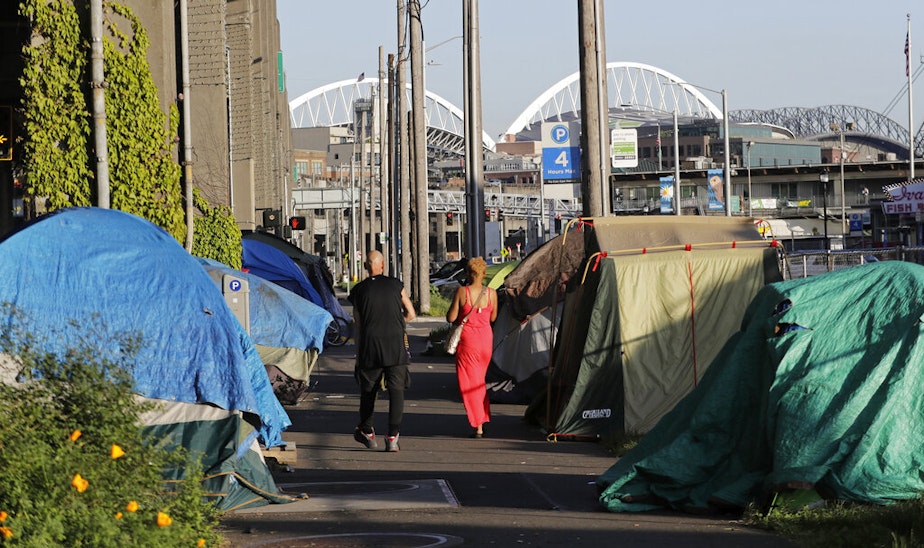King County leaders propose a tax levy for behavioral health clinics

For people in the midst of a mental health crisis, there are no public walk-in clinics available in King County. Now, there's an effort to change that.
On Monday, elected leaders, including King County Executive Dow Constantine and Seattle Mayor Bruce Harrell, announced plans for not one, but five crisis care centers. KUOW's Paige Browning talked to Kim Malcolm about the development.
This interview has been edited for clarity.
Kim Malcolm: What did officials announce today?
Paige Browning: A big, collaborative proposal. Not only does the county lack walk-in mental health centers, but it also has lost more than 100 residential treatment beds, and the county wants to bring those back as well.
Why the urgency on this issue now?
Behavioral health, including mental health and substance abuse disorders, is an intersection where all kinds of other issues meet: the ability to afford rent or utilities, to care for oneself, and to care for family. Officials have determined that this intersection has been left neglected, in some ways, and needs attention now. King County Councilmember Girmay Zahilay is one of the many government officials who came up with this proposal:
Sponsored
"If you break a bone in King County, you can walk in and get urgent care. If you're going through a mental health crisis or a substance use disorder crisis, you have zero urgent care options for a population of 2.3 million people. And this is why we see so many of our brothers and sisters, our family members, our neighbors, out suffering outdoors with a mental health crisis, or feeding their addictions at bus stops, or cycling between emergency rooms and jails and homelessness. It's because there is nowhere for people to go."
What needs to happen in order for these crisis clinics to open?
Three steps really. One, the county council will vote soon on whether to approve this as a ballot measure. Two, it would go to voters as a tax levy next April. Three, if voters approve it, the tax begins and starts bringing in money. That first step to get it on the ballot is all but official, since most of the county council is already backing this proposal.
This won't happen without voter approval and a whole lot of funding. Break down for us how this would be paid for.
In short, a property tax levy. The county determined it needs $1.25 billion to do this. The levy would be added to property tax bills for nine years. In simple math, it would cost the owner of a median-value home about $10 a month. That would bring in the money to get those centers and elements of a behavioral health care system in place.
Sponsored
People know it's not easy to get the care or treatment you or your loved one needs in this field. Once the clinics are up and running, who would be able to use them?
Anyone could walk into these clinics and receive care: Someone with financial means or insurance, someone with no insurance, someone having a substance abuse crisis, or a mental health emergency could just walk in, and be treated, and/or referred to the right place.
For some larger context, Washington ranks sixth in the nation for the highest prevalence of mental illness among adults. That's as of 2021. About 2 in 10 adults in Washington live with a behavioral health disorder or illness. And it's very prevalent among kids, so much so that Gov. Jay Inslee declared a youth mental health crisis in the past year, so the need is there.
Do we know where these clinics would go?
There are no exact locations yet, but I can tell you one area for sure, north King County. In some ways, that's where this whole discussion got started. Other than that, we don’t know the exact locations, but one will cater to youth.
Sponsored
Crisis facilities are one part of a bigger behavioral health plan announced today. What else is proposed?
Also included are plans to reopen dozens of beds in mental health care facilities that have closed because of funding woes – 100 spots in residential treatment facilities have closed since 2008. And a final piece of the package is creating career pathways for people to get into the behavioral health care workforce, such as apprenticeships, training, and equitable wages for the people that join this workforce.
Listen to the interview by clicking the play button above.






